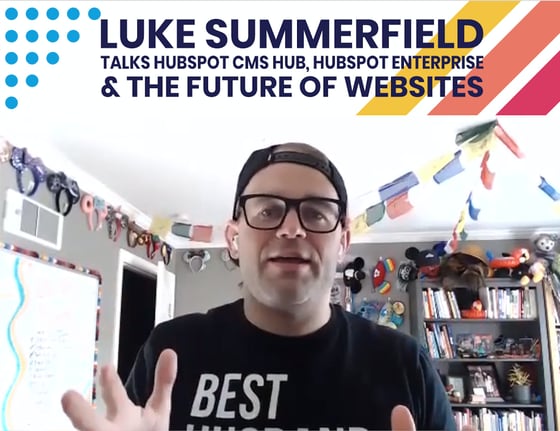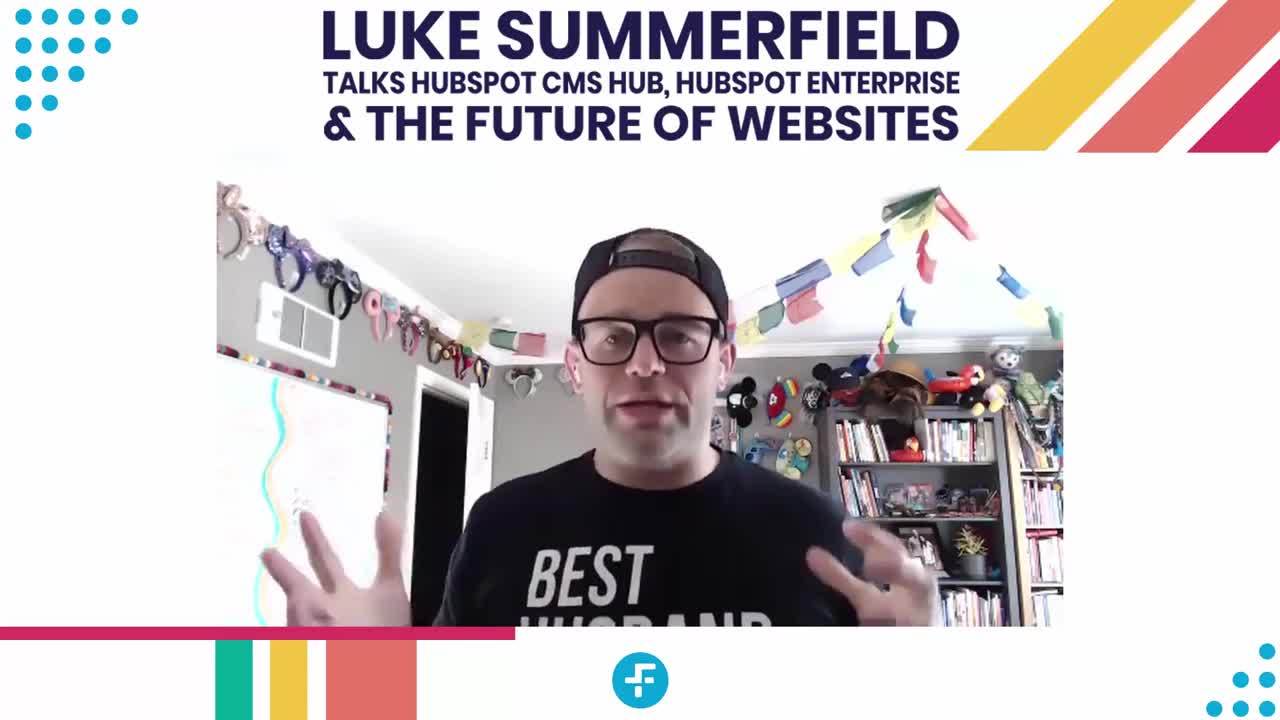


Luke Summerfield talks HubSpot CMS Hub & HubSpot Enterprise




The last few months have been an exciting time for those of us in the HubSpot ecosystem.
Most notably, a few months ago, HubSpot added a new Hub to its existing line of Sales, Marketing & Service with the introduction of its CMS Hub.
This will change how we think about and use our websites as marketers, sales pros and developers.
If you didn't notice that the CMS Hub had launched, it's because the launch has pretty low key up to now. Rightly, HubSpot decided an all singing all dancing release of a new product, even a cool one like CMS Hub, might not be the right thing to do in the middle of a global pandemic.
But while the release has been low key so far, the CMS Hub is out there and we thought who best to talk about it with, than HubSpot's resident go-to expert for all things Web dev and CMS Hub, Luke Summerfield.
We chatted to Luke about the launch of the CMS Hub and what we can expect from the platform both from a marketing and sales perspective, but also from an enterprise business and security standpoint.
Luke also spent time giving us his take on how the current situation has impacted the way businesses think about their website and what we can expect to see happening in the next few months as more businesses see the benefits of moving themselves online.
Introducing HubSpot CMS Hub
So if you know HubSpot at all, you know that it's had a pretty effective CMS for a while now, but the launch of CMS Hub takes this platform to a whole new level.
It doesn't just make it easier for marketers to edit web pages without begging for time from developers.
It also opens the door to create more customisations within HubSpot, which, historically, has been seen as something of a drawback of the CMS when compared to other open-sourced alternatives.
This is what Luke had to say about the new HubSpot CMS Hub:

"First, we have totally reimagined the editing experience on CMS Hub both for the marketer and developer. For the marketer, it's a 100% no code experience, you can change the looks, feel, style, layout and modules now without touching code.
"On the development side, we launched a new local development tool which allows them to use existing workflows and tools they already know and love, and just simply plug in Hubspot to create powerful apps and looks for their websites.
"The second thing I'm extremely about is the Enterprise tier for CMS Hub. In terms of new functionality, we now have the ability to build web applications on top of CMS Hub. That could look like building event registration tools, payment processing or subscriptions, client dashboards, payment calculators - there's all kinds of rich experiences that can be built on top of CMS Hub.
"But what makes the magic really happen is serverless functions, which are a place within the app where you can host little application code, without maintaining servers. It's very safe and secure within the system, but you can build Javascript apps within that system and run them directly with HubSpot."
From a personal standpoint, this serverless function announcement is a real game changer for HubSpot as it competes in the Enterprise space. One of the historial complaints we used to hear was the lack of back-end customisation within the CMS. These serverless functions get hurdle completely so will make a huge difference. But anyway, back to what Luke was saying.
"The third thing I'm excited about, is that just like all the tools on HubSpot, the CMS Hub connects with everything else in the HubSpot platform. So if you use the other Hubs it connects with them, but right out of the box you can use the CMS directly with the CRM and use that rich data on your website to build personalised experiences.
"There's a lot of power to be unlocked when you have these tools all boxed within one system."
How does HubSpot CMS Hub perform in the enterprise space?
Historically, HubSpot had been known as a marketing and sales tool for small and medium sized businesses with potential to scale. Nowadays, they're very much a factor in the enterprise space as well, and the CMS Hub is another indicator of that.
This is something we talked to Luke about specifically, and this is what he had to say.
"If you look at the upper mid-market organisations looking to scale to the next level, they need governance and control at scale. So that's a set of features we've built into CMS Hub that will enable IT teams, security teams and operations teams to build structure and governance in a site when you have many people from an organisation working on it.
"So some of the features include user and team access controls, content partitioning to assign what content is and isn't available to some teams, a new performance API to monitor the performance of your website and flag any issues before they ever happen.
"Also many times with the upper mid-market companies, they have a need for multiple websites. Whether that's a microsite for an event, or having a different site for brands in different regions.
"Historically at Hubspot it's been difficult to add on those additional websites. But, with CMS Hub Enterprise, you can add brand domains so that as your brand expands globally you're able to easily spin up a website that runs within HubSpot.
"With CMS Hub Enterprise it comes with two websites right out of the box, so you have your main website and a second one added within the price of your subscription."
How has COVID-19 changed the way brands think about and use their website?
"Obviously as horrible as the global pandemic has been, it's been a forcing function for a lot of companies to start thinking about their digital marketing and their digital presence.
"This has always been one of those things companies have said 'we'll get to that' but now for a lot of companies, their digital presence is their main presence and it's forced a lot to prioritise that digital presence.
"They're having to think now how they can take some of those real-life experiences like a trade show, retail store or meeting in person and create digital experiences around that. So how can you leverage your site to accept payments and create new revenue streams? Or put in place digital experiences to support existing customers?
"And that comes back to having your CMS connected to CRM data to create a powerful experience. In some ways, this has been a light bulb moment for some companies to think about how they grow their website."
Building security around the CMS Hub
One of the final things we spoke to Luke about is the issue of creating a CMS for enterprise, while ensuring you have the high level of security they need.
First he described four major shifts in the CMS market:
"Maintenance and security is the first shift. If you look at traditional CMSs, they force you to focus an inordinate amount of time to maintain the system because, as you grow, you have to add on more systems and more platforms.
"So as you grow you keep adding more and more and eventually the system becomes quite clunky. Within that there's a high level of management and manual security updates that need to happen to keep the website going. The flip side of that is that it pulls you away from time with your customers.
"If you look at a modern CMS like HubSpot, Shopify or Squarespace, they're built on a SaaS infrastructure. So that means the maintenance and security updates are taken care of for you, which frees up your time to focus on customers.
"At HubSpot, we've built that infrastructure for you which means you have a website which is fast, secure and scalable and you don't have to worry about the infrastructure or the management.
"Within that we have a dedicated content delivery network, there's a web app firewall and machine learning algorithm which checks for anything happening that shouldn't be as well as SSL and a slew of other things included for those that need a higher, or custom level of security.
"On top of all that we also have a 24/7 support team of people who are constantly monitoring what's happening and are there to dive in to solve problems whenever they're needed. We think of all this just like we think about our other Hubs. It's designed to be fast, secure and reliable to free you up to concentrate on your business."
Did you like what Luke had to say and think HubSpot might be for you? Or that you could get more out of HubSpot if you already have it?
Download out free guide to the benefits of working with a HubSpot Partner and see what else you could be doing with the tool if you had a team of HubSpot experts helping you.








